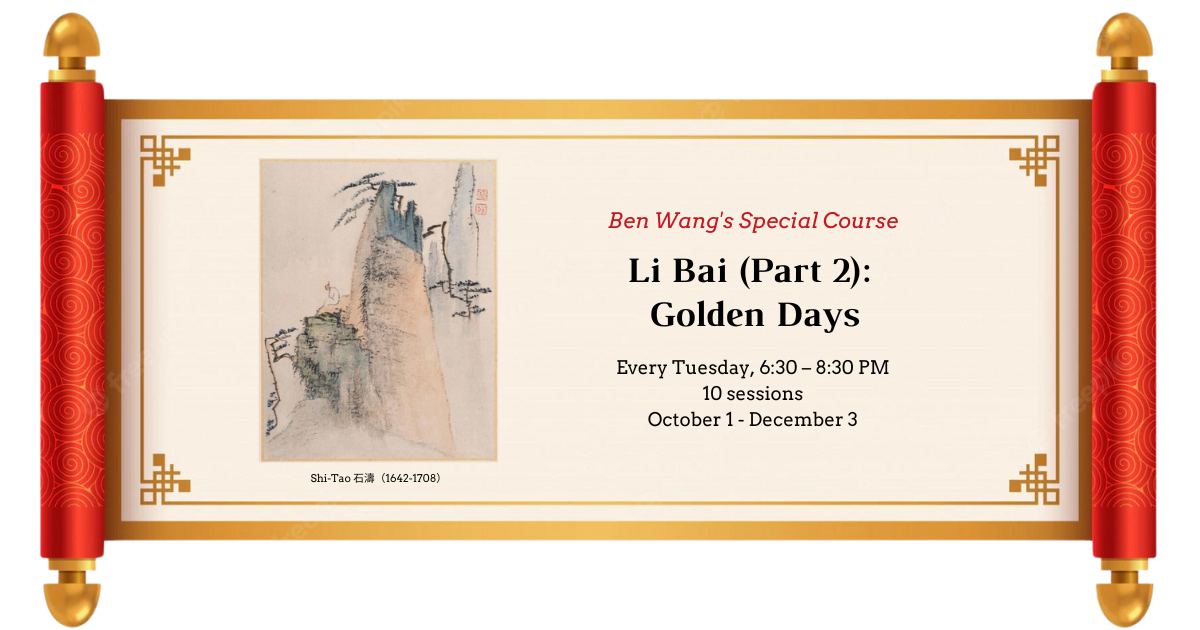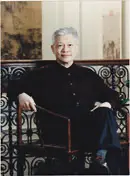
Starting Tuesday, October 1 (2024), Li Bai (Part 2):Golden Days on the life and works of Li Bai (701-762), arguably the greatest poet in Chinese literature, will be offered, will pick up from where Li Bai (Part 1) was left off in early June, 2024, at the point when Li Bai, seeking for gain of recognition of a wider public, left in 723 the southwestern Sichuan province where he grew up and much influenced by the bravura spirit in poetry of many previous masters during the early Tang. He traveled down through the Yangtze Valley and stayed in Jin-ling (Nanjing, today) for almost a year, where he composed the legendary ballad, Calling from Chang-gan, the center piece of our study last semester.
The ensuing 21 years (from 723 to 744) of Li Bai’s legacy of timeless poetic works on wine, moon, friendship, parting, sights of Nature in different seasons, joys and sorrows, glory and drifting in life, transcendent Daoist spirit: transporting inspirations that make up his literary oeuvres, will be selected and explored through a detailed reading of the original poems in Chinese, which is the curriculum of Li Bai (Part 2): Golden Days.
Poems in different styles: pentasyllabic and heptasyllabic quatrains and regulated verses, as well as ballads, antiquated style poems, all of which revealing spontaneity and Romanticism in how Li Bai with insouciance dashed off poems of lasting power that manifest his genius being none other than the true topic of his poetry, will be the focal point of the coming semester.
[Li Bai (Part 3): Twilight Years, the final 18 years of Li Bai’s life and work, will follow in the winter semester later this year into early 2025.]
Class Schedule
Tuesday, 6:30 – 8:30 PM
October 1 – December 3
10 sessions (20 hours)
$550 member / $590 non-member
(plus a $30 non-refundable registration fee)
This class will be taught in English.

Ben Wang: Senior Lecturer in Language and Humanities at China Institute, Co-Chair of Renwen Society of China Institute, retired Instructor of Chinese at the United Nations Language Program. A published writer on classical Chinese poetry and others, Ben Wang is an award winning translator both from Chinese into English and vice versa; He taught Chinese and translation at Columbia University, New York University, Pace University and City University of New York between 1969 and 1991.
Ben Wang teaches and lectures on the Chinese language, calligraphy, and classical Chinese literature, including the Book of Songs, the Songs of the South; Han, Tang and Song poetry; Yuan and Ming poetic dramas; Story of the Stone of the Qing; classical Kunqu Drama and Beijing Opera; Literati Painting. Ben Wang’s lectures on and translations of Kunqu dramas have been reviewed and acclaimed three times in the New York Times by the Times’ music and drama critic James Oestreich as “magnificent,” “captivating,” and “colorful.”
Since 1989, Ben Wang has lectured (extensively on the above-mentioned subjects)at Yale, Princeton, Columbia, Barnard, Williams, U.C. Berkeley, New York University, Bates, Colby, Hamilton, Middlebury, Rutgers, Seton Hall, St. Mary’s College in California, the Smithsonian, the National Gallery of Art, United Nations, Lincoln Center, the Metropolitan Museum of Art, Seattle Art Museum, Museum of Fine Arts of Boston, ABC Nightline, the BBC, among other academic and cultural institutions.
Latest publications in English:
(Published by China Institute and Released by Tuttle Publishing; 2014, 2015, the series has garnered 9 US book awards, as of September 2016.)
(January 2019)